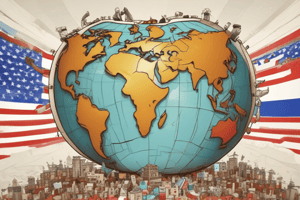Podcast
Questions and Answers
Which ideology emphasizes individual freedoms and minimal government intervention?
Which ideology emphasizes individual freedoms and minimal government intervention?
- Communism
- Conservatism
- Liberalism (correct)
- Socialism
What is defined as the supreme power or authority of a state within its own territory?
What is defined as the supreme power or authority of a state within its own territory?
- Regime
- Authority
- Sovereignty (correct)
- Government
Which method in political science is primarily concerned with statistical analysis to identify patterns?
Which method in political science is primarily concerned with statistical analysis to identify patterns?
- Case study analysis
- Quantitative methods (correct)
- Experimental methods
- Qualitative methods
Which of the following methodologies relies heavily on mathematical or logical models?
Which of the following methodologies relies heavily on mathematical or logical models?
Which of these is NOT a characteristic of political culture?
Which of these is NOT a characteristic of political culture?
What is the primary focus of political theory in political science?
What is the primary focus of political theory in political science?
Which branch of political science focuses on the analysis of political systems across different countries?
Which branch of political science focuses on the analysis of political systems across different countries?
What does the concept of legitimacy refer to in political science?
What does the concept of legitimacy refer to in political science?
In the context of political science, what is authority?
In the context of political science, what is authority?
Which area of political science looks into how governments make and implement policies?
Which area of political science looks into how governments make and implement policies?
What central concept in political science refers to the ability to influence others?
What central concept in political science refers to the ability to influence others?
Which of the following best describes ideology in the context of political science?
Which of the following best describes ideology in the context of political science?
What is a major area of study in international relations?
What is a major area of study in international relations?
Flashcards
Political Culture
Political Culture
Shared values, beliefs, attitudes, and norms about politics, shaping citizen behavior and expectations.
Sovereignty
Sovereignty
A state's supreme power within its territory.
Qualitative methods
Qualitative methods
In-depth studies (case studies, interviews, texts) to understand political issues.
Quantitative methods
Quantitative methods
Signup and view all the flashcards
Formal modeling
Formal modeling
Signup and view all the flashcards
Political Science
Political Science
Signup and view all the flashcards
Political Theory
Political Theory
Signup and view all the flashcards
Comparative Politics
Comparative Politics
Signup and view all the flashcards
International Relations
International Relations
Signup and view all the flashcards
Public Policy
Public Policy
Signup and view all the flashcards
Power
Power
Signup and view all the flashcards
Authority
Authority
Signup and view all the flashcards
Legitimacy
Legitimacy
Signup and view all the flashcards
Study Notes
Core Concepts of Political Science
- Political science is the systematic study of government, politics, and political processes. It encompasses a wide range of topics, examining the structures, functions, and behaviors of political systems at various levels, from local to international.
- Key areas of study include political theory, comparative politics, international relations, and public policy.
- Political science explores how individuals and groups interact in political contexts, including elections, political parties, interest groups, and the media.
Branches of Political Science
- Political Theory: Examines the fundamental concepts of justice, freedom, and power, exploring philosophical and ethical dimensions of political life. Key figures and theories are frequently studied, including Plato, Aristotle, Locke, and Marx, as well as contemporary political thought.
- Comparative Politics: Analyzes political systems across different countries and regions. This area focuses on institutional structures, political cultures, and policy differences, utilizing comparative analysis to identify patterns and trends.
- International Relations: Investigates the interactions between states and other actors in the international system, such as international organizations, non-governmental organizations, and multinational corporations. Issues like war, peace, trade, and diplomacy are prominent in this field.
- Public Policy: Studies the processes through which governments make decisions and implement policies. It covers policy formation, implementation, and evaluation, examining the factors influencing policy choices and the impact of policies on individuals and society.
Key Concepts in Political Science
- Power: The ability to influence or control others or events, a central concept in political science, and often studied in the context of political institutions, actors, and ideologies.
- Authority: The right to command that is often legitimized by tradition, law, or custom. It's closely related to power but carries a different implication of acceptance and legitimacy.
- Legitimacy: The belief that a government or political system has a right to rule, deriving from societal acceptance or consent. This often plays a significant role in the stability and effectiveness of political systems.
- Ideology: A system of beliefs and values that shape a person or group's views about society and politics. Various ideologies, such as liberalism, conservatism, socialism, and communism, guide individuals' and groups' political choices and actions.
- Political Culture: The shared values, beliefs, attitudes, and norms about politics that shape citizens' behavior and expectations in a particular society.
- Sovereignty: The supreme power or authority of a state within its own territory.
Methodologies in Political Science
- Qualitative methods: Often involve in-depth case studies, interviews, and textual analysis, aiming at understanding the context and nuances of political phenomena.
- Quantitative methods: Use statistical analysis and data to identify patterns and test hypotheses, often used for analyzing large-scale datasets and elections.
- Formal modeling: Develop mathematical or logical models to understand particular aspects of political systems, typically relying on assumptions, variables, and other aspects of formal language and logical reasoning.
- Experimental methods: Incorporate controlled experiments to test hypotheses in controlled environments. While less prevalent in political science than other social sciences, this approach is sometimes employed.
Studying That Suits You
Use AI to generate personalized quizzes and flashcards to suit your learning preferences.




